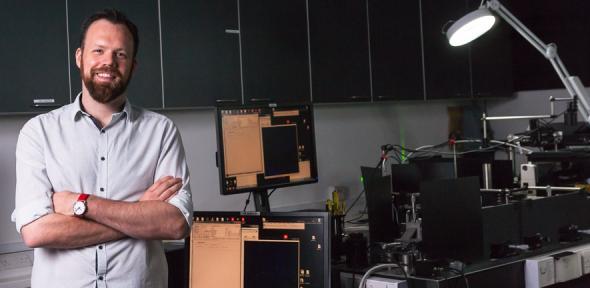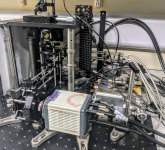
ZOMP
Professor of Biophysical Chemistry Steven Lee believes that one day ‘to Zomp’ will mean to carry out high-volume, three-dimensional imaging of individual cells.
That’s because Lee’s new company, ZOMP, is developing the world’s first 3d imaging flow cytometer, which will enable highly accurate quantitative imaging of millions of cells in a single experiment. Zomp’s new cytometer is set to revolutionise the way cells are analysed and sorted in fields like immunotherapy, drug discovery and cancer diagnosis.
Seed round success
In April 2023 ZOMP received £2 million in a seed funding round co-led by ZEISS Ventures, Foresight WAE Technology and BGF. ZOMP will use the funds to develop a minimum viable product and identify optimal customer applications.
“ZOMP's innovative technology has the potential to disrupt the current flow cytometry market due to its ability to capture not only binary information about cells, but also morphological and spatial information at a single cell level. In the future, image-based cell sorting will enable new experiments in life science and biotechnology applications. ZEISS Ventures is very pleased to support ZOMP's journey not only with financial resources, but also with our know-how in imaging and image analysis,” says Gerrit Schulte, Head of ZEISS Ventures.
The revolutionary 3D imaging flow cytometer
 Lee co-founded ZOMP with Gillies Kleboe and Dr. Kevin O’Holleran, the Academic Director of Cambridge Advanced Imaging Centre. The colleagues have been supported throughout the spin-off process by Cambridge Enterprise (CE), whom they first approached in 2021 with a proposition to commercialise their idea for a new type of instrument which would combine the best of optical microscopy and cytometry.
Lee co-founded ZOMP with Gillies Kleboe and Dr. Kevin O’Holleran, the Academic Director of Cambridge Advanced Imaging Centre. The colleagues have been supported throughout the spin-off process by Cambridge Enterprise (CE), whom they first approached in 2021 with a proposition to commercialise their idea for a new type of instrument which would combine the best of optical microscopy and cytometry.
CE helped with patent applications and the licensing of intellectual property, and provided training on writing a business plan and conducting market research through the I-Teams programme. An Impact Acceleration Grant provided the funds for postdoctoral researcher Dr Terry Wright to develop a commercial prototype. “We’ve had incredible support from the University and also from the Department,” says Lee. “I guess you can say we’ve been through the famous Cambridge ecosystem.”

